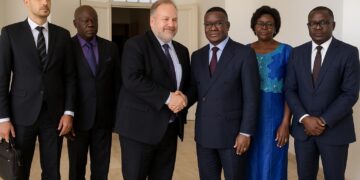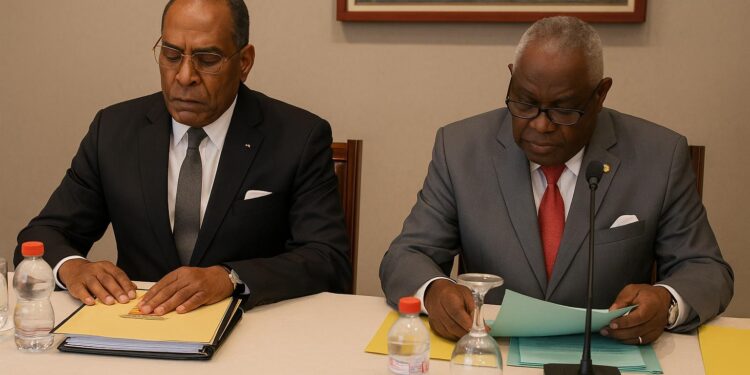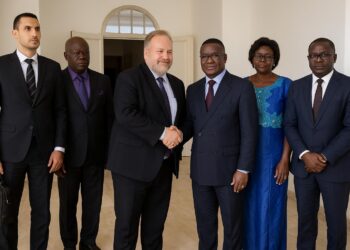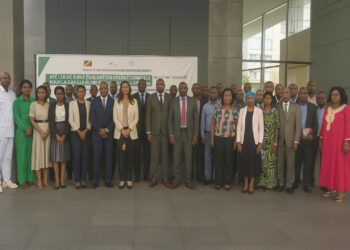Senate leadership finalises packed agenda
Meeting on 8 October in Brazzaville, the Conference of Presidents—the body that aligns government and parliament—adopted a 12-item programme for the ordinary budget session expected to open on 15 October, sources close to the secretariat confirmed (Agence Congolaise d’Information, 9 Oct.).
Senate President Pierre Ngolo presided over the deliberations in the presence of Prime Minister Anatole Collinet Makosso, indicating close executive–legislative coordination as the fiscal calendar tightens ahead of year-end appropriations. Observers noted the consensual atmosphere and an emphasis on delivery rather than controversy.
2026 finance bill and mid-term adjustment
Flagship of the agenda is the Draft Finance Law for 2026, the first to integrate the government’s medium-term expenditure framework 2024-2026 and its commitments under the IMF Extended Credit Facility. A finance ministry official cited conservative oil price assumptions of USD 65 per barrel to preserve fiscal buffers (Les Dépêches de Brazzaville, 10 Oct.).
Two complementary texts will also be scrutinised: the Draft Amending Finance Law for 2025, meant to align spending ceilings with updated revenue forecasts, and the Draft Budget Settlement Law for 2024, which will provide a final audit of last year’s out-turns. Together they form the trilogy that anchors parliamentary oversight of public accounts.
Economists underline that timely adoption of those documents could unlock the next IMF disbursement, sustain concessional financing from the African Development Bank and reassure local investors dependent on treasury bill auctions for liquidity.
Updating electoral rules and forestry research
Law-makers will debate amendments to Act 9-2001 on electoral governance, a statute last revised in 2016. According to Interior Ministry sources, proposed changes relate to biometric voter rolls, clearer campaign finance ceilings and harmonised dispute-resolution timelines—measures designed to strengthen transparency ahead of municipal polls slated for 2027.
Stakeholder consultations held in August with civil-society networks and political parties paved the way for the draft, which maintains the existing two-round system but codifies digital transmission of results from precincts to the national tally centre. Observers say the technical tweaks, while limited, respond to lessons drawn from previous electoral cycles.
Parallel to electoral reform, senators will revisit the law founding the National Institute for Forestry Research (IRF) to expand its mandate on value-chain innovation and carbon-credit measurement. Officials at the Ministry of Forest Economy argue the upgrade is critical for Congo’s ambition to monetise its Congo Basin carbon sinks (EcoMatin, 7 Oct.).
Reproductive health and human capital priorities
A new draft bill on reproductive health features prominently among the social-policy items. The text, prepared by the Health and Population Ministry with support from UNFPA, champions access to family-planning services, prenatal care and adolescent education, while respecting cultural sensibilities.
Women’s groups welcomed the proposal as a pragmatic step toward meeting Sustainable Development Goal 3, citing persistent maternal mortality of 225 per 100,000 live births. Sponsors insist the bill focuses on preventive care and does not alter the existing legal framework on pregnancy termination, thereby generating broad parliamentary support.
Economists link improved reproductive health to long-term workforce productivity and fiscal sustainability, noting demographic pressures on urban infrastructure. The Senate’s debate will thus intersect with macro-planning considerations embedded in the 2026 budget projections.
Procedural timeline and implications for investors
Under Senate rules, each text will undergo committee examination, followed by joint oral briefings from the competent ministers and a public plenary vote. The calendar anticipates first readings between 20 October and 5 November, giving the upper chamber time to reconcile with the National Assembly before the constitutional deadline in December.
Prime Minister Collinet Makosso told reporters that the government seeks “rigorous yet swift” passage to maintain funding flows for infrastructure, energy diversification and the digital economy, sectors highlighted in the National Development Plan 2022-2026 (Radio Congo, 9 Oct.).
For investors, the session offers forward guidance on taxation, public procurement pipelines and regulatory shifts in forestry, health and electoral technology. Market analysts advise monitoring committee reports for clues on spending priorities, notably allocations to road corridors, power interconnections and public-private partnerships in fibre-optic networks.
If adopted on schedule, the 2026 Finance Law will be promulgated before 31 December, providing legal certainty for corporate budgeting, rating-agency assessments and regional bond issuances on the Central African securities exchange. The Senate’s disciplined approach thus serves as a confidence signal to domestic and international stakeholders.












































